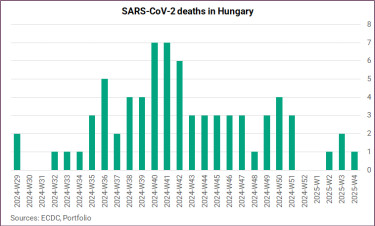New Covid variant is spreading in Hungary - Here are the main symptoms

"The incidence of respiratory infections may increase as children return to school," said Ágnes Galgóczi, director of prevention and epidemiology at the National Public Health and Medical Centre (NNGYK), speaking on InfoRadio.
The NNGYK is constantly monitoring the development of the epidemic. According to experts, a new coronavirus variant is spreading, as indicated by a slight increase in the concentration of viral genetic material in the wastewater of certain cities, including Szekszárd, Szolnok and Tatabánya.
The NNGYK is constantly monitoring the development of the epidemic. According to experts, the new variant of the coronavirus is spreading, as indicated by a slight increase in the concentration of viral genetic material (RNA) in the wastewater of certain cities, including Szekszárd, Szolnok and Tatabánya.
"The new variant of Covid-19 causes a mild respiratory infection or an asymptomatic infection, which is clearly due to the previous intensive vaccination campaign and the development of herd immunity.
The new Nimbus variant does not cause more severe illness than previous variants,
emphasised Ágnes Galgóczi.
She mentioned coughing, sore throat, blocked nose, headache, fatigue and, occasionally, vomiting or diarrhoea as typical symptoms of the infection. While the new variant is generally mild, it can cause more severe illness in elderly and chronically ill people.
XFG has been designated a SARS-CoV-2 variant under monitoring (VUM) with increasing proportions globally. Considering the available evidence, the additional public health risk posed by XFG is evaluated as low at the global level, the World Health Organization (WHO) said in a mid-June report. Currently approved COVID-19 vaccines are expected to remain effective to this variant against symptomatic and severe disease. Several countries in the South-East Asia Region (SEAR) have reported a simultaneous rise in new cases and hospitalisations, where XFG has been widely detected. Current data do not indicate that this variant leads to more severe illness or deaths than other variants in circulation. The available evidence on XFG does not suggest additional public health risks relative to the other currently circulating Omicron descendent lineages.
Good hand hygiene and coughing and sneezing etiquette remain key to preventing the spread of infection. If you have respiratory symptoms, you are advised to stay at home for a few days. If your symptoms persist, you should consult a doctor. The director emphasised that "high fever, a persistent cough, feeling unwell to the point of being unable to carry out daily activities, lethargy and fatigue are all reasons to see a doctor."
Ágnes Galgóczi also pointed out that, while symptoms can be alleviated with fever and cough suppressants, a medical examination may reveal complications such as pneumonia. This requires specific treatment, which may include antibiotic therapy. It is definitely recommended to consult a doctor if symptoms persist for more than a few days and do not improve.
The NNGYK publishes weekly reports on acute respiratory infections (ARI), including influenza-like illnesses (ILI), SARS-CoV-2, RSV, and HMPV infections between the 40th and 20th weeks during respiratory seasons. Read our last report on the 2024/25 season here. The first report for the 2025/26 season is due in four weeks, but there could be delays.

We also keep an eye on the number of pertussis and hepatitis A infections that have been rampant for some time now in Hungary.
Cover image (for illustration purposes only): Getty Images












